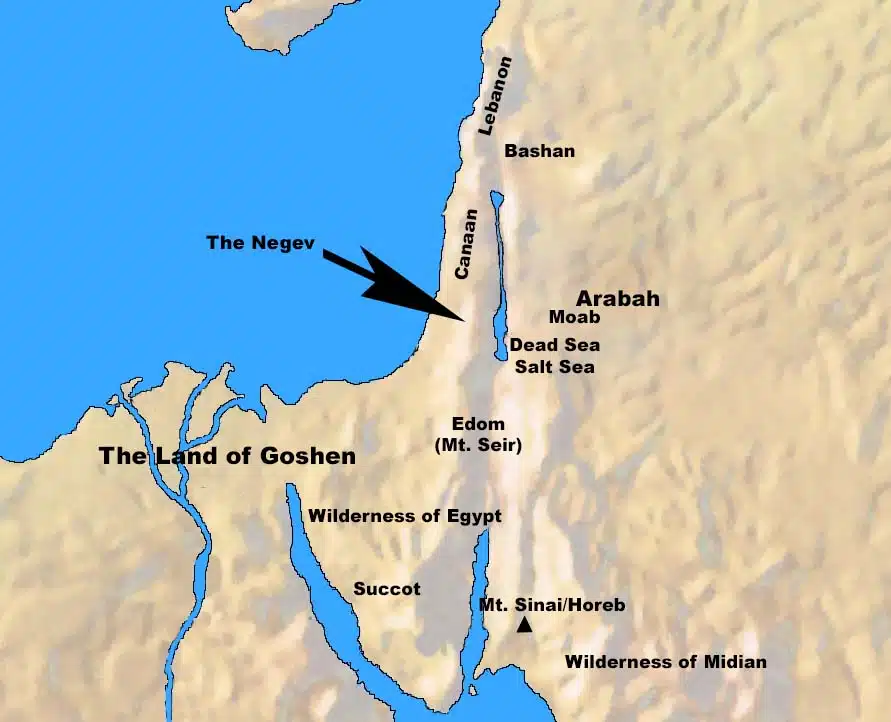Moses continues his history lesson. God judged the first generation of Israelites for covenant violation by precluding them from entering the Promised Land.
In the previous section (vv. 26-33), we saw that the issue of unbelief laid at the root of the rebellion of the first generation of Israelites. They grumbled saying that God hated them and intended for them to be destroyed by the people living in Canaan. That reaction provoked God to discipline His people for covenant violation. God was angry and took an oath that this generation would not enter the land that He promised to their fathers, calling them evil. The exception was Caleb, Joshua, and the little ones that the people said would become a prey to the inhabitants of the land.
Rather than become prey, God says these little ones shall enter there and shall possess it. This is an important part of the history lesson, because this was spoken of the generation now hearing the words of Moses. Moses is telling them that God spoke that they would enter and possess the land.
Moses is also included among those who would not conquer the land, not because of this kind of rebellion, but because of his own sin. In the incident recorded in Numbers 20, we see that God commanded Moses to speak to the rock to bring water for the thirsty people (Numbers 20:8). However, instead of speaking to it, he (Moses) struck it twice out of anger. Such a behavior had a double implication. First, it demonstrated Moses’ lack of obedience to the LORD. Second, it brought dishonor to God. He was not treated as “holy in the sight of the sons of Israel” (Numbers 20:10-13).
The book of Numbers tells us that all the men who, after witnessing God’s power at work in Egypt and in the wilderness, have rebelled in their unbelief, would not see the fulfillment of the promise (Numbers 14:22-23). That judgment specifically applied to those who were twenty years of age and older except for Caleb and Joshua (Numbers 14:29-30). The exclusion of Caleb and Joshua from the punishment is clear. Caleb was the only spy who quieted the people when they were grumbling and told them not to fear because God was going to give them victory (Numbers 13:30). That is why our passage says that he has followed the LORD fully.
Joshua was the assistant of Moses and was a faithful spy along with Caleb. He was the commander who led the Israelites when they defeated Amalek, as recorded in Exodus 17:8-16. Thus, God allowed these two men (Caleb and Joshua) to enter the land because they had proved faithful. This establishes the pattern that God’s rewards come to those who will have the faith and courage to possess what God has granted.
God allowed those who were children at the time of the rebellion to enter and conquer the land because they were innocent. The text says that they had no knowledge of good or evil. As for the Israelites who willingly disobeyed the covenant of the LORD, they had to leave Kadesh Barnea, at the edge of the Promised Land and set out toward the wilderness to the Red Sea.
The innocent ones are not charged with responsibility for the rebellion and are given the opportunity to possess the land. However, they inherited the situation created by the choices of their parents. It is now their nation. So, Moses is speaking to them as the nation who made these choices, and now has inherited the consequences.
The penalty inflicted on the disobedient Israelites (including Moses) in contrast with the sparing of Joshua, Caleb, and the children, demonstrates God’s justice and faithfulness. He was faithful in continuing the covenant. He was just in disciplining the disobedient Israelites while allowing the faithful ones and the innocent children to possess the land that He had promised to Abraham’s descendants.
Biblical Text
34 “Then the Lord heard the sound of your words, and He was angry and took an oath, saying, 35 ‘Not one of these men, this evil generation, shall see the good land which I swore to give your fathers, 36 except Caleb the son of Jephunneh; he shall see it, and to him and to his sons I will give the land on which he has set foot, because he has followed the Lord fully.’ 37 “The Lord was angry with me also on your account, saying, ‘Not even you shall enter there. 38 ‘Joshua the son of Nun, who stands before you, he shall enter there; encourage him, for he will cause Israel to inherit it. 39 ‘Moreover, your little ones who you said would become a prey, and your sons, who this day have no knowledge of good or evil, shall enter there, and I will give it to them and they shall possess it. 40 ‘But as for you, turn around and set out for the wilderness by the way to the Red Sea.’
Check out our other commentaries:
-
Exodus 35:4-9 meaning
Moses called upon the Israelites to voluntarily contribute the raw materials for the construction of the tabernacle and its furnishings. ...... -
Colossians 3:9-11 meaning
Paul continues his description of behaviors that are not in alignment with the reality of Christ, or the true benefit of the Colossian believers, and...... -
Romans 9:30-33 meaning
Righteousness can only be gained one way: through faith. The Gentiles (people who are non-Jewish) found righteousness through faith, even though they were not looking...... -
Matthew 1:6b-8 meaning
In Matthew 1:6-8 Matthew continues the genealogy of Jesus from David through the succession of kings from Solomon to Jeconiah whose reign ended with the...... -
Exodus 29:36-37 meaning
Now that the priests had been purified and set apart for the ministry, the altar was next. Purifying the altar was also to be a......




